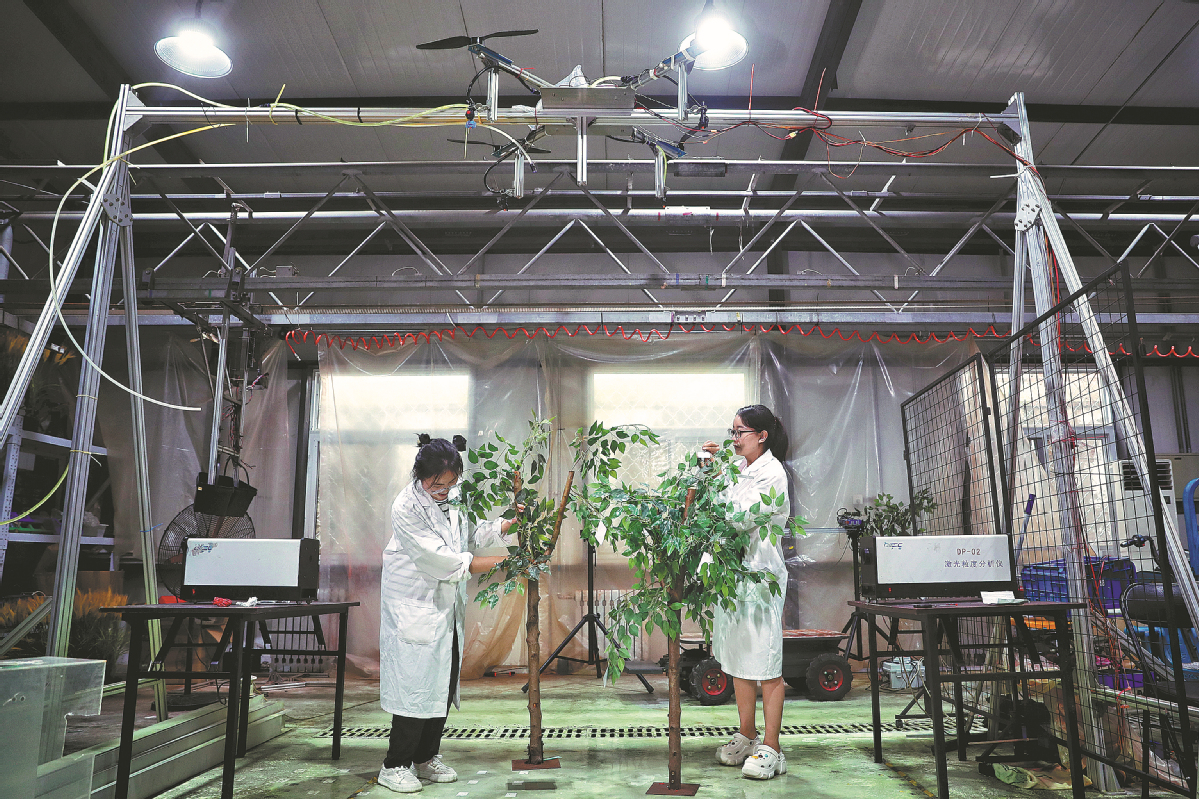May 27, 2025 | 00:55 GMT +7
May 27, 2025 | 00:55 GMT +7
Hotline: 0913.378.918
May 27, 2025 | 00:55 GMT +7
Hotline: 0913.378.918

Two students tie test cards to small trees at the China Agricultural University's school of unmanned systems for agriculture in Beijing. They are experimenting to gauge different wind fields in drone operations. Photo: Xue Jun/For China Daily
Behind the 3.33-hectare orchard is the research team from the unmanned systems for agriculture at the China Agricultural University.
The team has developed high-tech equipment to boost farm efficiency.
"Through digital management and mechanized operations, labor costs can be reduced by more than 50 percent and pesticide and fertilizer use can be cut by 30 to 40 percent. As a result, the comprehensive benefits can be increased by 32.5 percent," He Xiongkui, a university professor, says.
His team is testing out a new robot which will handle the tasks of removing branches, finding ripe peaches and picking them to save money and labor.
Besides He, there are 13 academics and 411 PhD agriculture students participating in 117 farms in Pinggu district, Beijing, since the local government initiated a program called PhD farms in April last year, aiming to attract experts in agriculture.
They have brought more than 1,000 varieties of high-quality seeds, including buckwheat, aerobic rice, vegetables, fruit and mushrooms, to Pinggu.
"We want to run the final lap in turning new technology into reality in farms," Wang Zhenyu, deputy director of Pinggu's agriculture and rural affairs bureau, says.
Zhou Meiliang, researcher from the Chinese Academy of Agricultural Sciences, is among the first batch attracted to the program. He has selected buckwheat seeds suitable to grow in the district. As buckwheat is grown for its colorful flowers and tasty seeds, Zhou says, it can benefit tourism and the economy for villagers.
Over the upcoming National Day Holiday in October, Zhou believes that the blooms with their its eye-catching red, white and pink hues, will bring more people to Pinggu.
Next to Zhou's buckwheat farm is the experimental field of aerobic rice planted by Zhu Zuofeng, professor of the China Agricultural University. Aerobic rice, also known as upland rice, has been turned into a commercial crop that can be planted in desert. Consequently, it has the potential to help solve food shortages in places with parched climates.
Although producing less yields than lowland rice, the aerobic rice in Zhu's field offers the chance to grow rice using less water.
In Wang's words, specialists, like Zhu and Zhou, have brought innovation and technology to the district.
"PhD students and professors bring hope to our village," Wang Yanjin, head of Beitaitou village, says. As technology is introduced, villagers are expanding selling channels, online and off, to promote their products. Every day, Wang Cuiyun, 52, hosts livestreams selling corn on social media.
"My corn is different to other corn. What I promote is corn planted by PhD students and agronomists," Wang Cuiyun says.
The corn is grown by the team of Wang Ronghuan, head of the Maize Research Center, Beijing Academy of Agriculture and Forestry Sciences. The team has transformed 13.33 hectares of poor land into a productive corn field.
"In the future, Pinggu will launch more policies to support the development of 'PhD farms', letting technology and innovation benefit every farmer in the district," Wang Zhenyu says.
(Chinadaily)

(VAN) Alt Carbon has raised $12 million in a seed round as it plans to scale its carbon dioxide removal work in the South Asian nation.

(VAN) Attempts to bring down the price of the Japanese staple have had little effect amid a cost-of-living crisis.

(VAN) Fourth most important food crop in peril as Latin America and Caribbean suffer from slow-onset climate disaster.

(VAN) Shifting market dynamics and the noise around new legislation has propelled Trouw Nutrition’s research around early life nutrition in poultry. Today, it continues to be a key area of research.

(VAN) India is concerned about its food security and the livelihoods of its farmers if more US food imports are allowed.

(VAN) FAO's Director-General emphasises the need to work together to transform agrifood systems.

(VAN) Europe is facing its worst outbreak of foot-and-mouth since the start of the century.